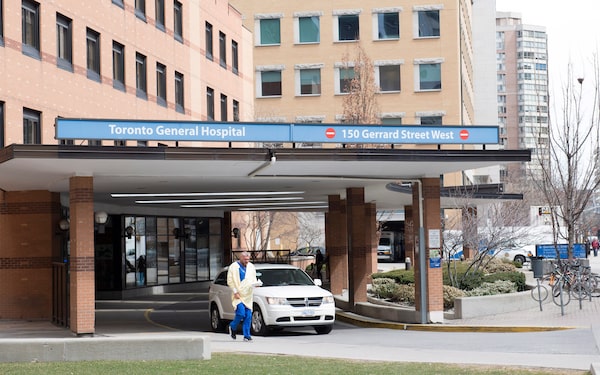
In 2022, hospitals will account for 24.3 per cent of all health care spending, while physicians and drugs are each expected to account for 13.6 per cent, CIHI data show.Doug Ives/The Canadian Press
Health care spending is levelling off in Canada, after surging in the first two years of the COVID-19 pandemic, according to new figures from the Canadian Institute for Health Information (CIHI).
Based on its latest data, CIHI anticipates Canadians will spend $331-billion, or $8,563 per person, on health care through the public and private sectors in 2022. That’s an increase of 0.8 per cent from the previous year, compared with growth rates of 13.2 per cent in 2020 and 7.6 per cent in 2021, owing to the pandemic.
But even though it’s now slowing, health care spending is not returning to pre-pandemic levels, said Chris Kuchciak, manager of health expenditures at CIHI.
Canada isn’t making the most of its family doctors’ time in the face of critical shortages
“What we’re seeing is spending continuing to increase,” he said, explaining that while COVID-19 expenses are retreating, “things like the use of health care, population aging, population growth, these are all now coming forward as those strong drivers that are taking over spending.”
Pre-pandemic, the average rate of spending growth was 4 per cent per year.
CIHI forecasts federal, provincial and territorial governments will spend a combined total of $376 per person on health-specific funding for COVID-19 in 2022, down from $770 per person in 2020.
Meanwhile, spending has rebounded in other areas, such as dental care and vision care professionals and physiotherapists, which had declined amid closures and fear of catching COVID-19 earlier in the pandemic, Mr. Kuchciak said. And spending on hospitals and physicians has accelerated, with efforts to catch up on surgical backlogs and other care that was deferred during earlier COVID-19 waves.
Most of the money continues to go toward hospitals, physicians and drugs, which have long been the top categories for spending. In 2022, hospitals will account for 24.3 per cent of all health care spending, while physicians and drugs are each expected to account for 13.6 per cent, CIHI data show.
Home and community care make up a much smaller portion, at 3.8 per cent. However, Mr. Kuchciak notes this figure captures only public spending.
When it comes to spending on drugs, Mr. Kuchciak said he sees a continuation of pre-pandemic trends. As the patents for brand name drugs expire, they’re replaced with cheaper generic drugs, which has a dampening effect on the growth in spending, he said. However, that is offset by the introduction of high-cost new drugs, such as biologic drugs made from living organisms or cells, used to treat a variety of conditions, including diabetes, hormone deficiency and rheumatoid arthritis. In a November report, CIHI found a class of drugs for diabetes and drugs for retinal diseases were the top contributors to growth in spending.
While drug spending grew 1.6 per cent in 2020, CIHI projects it will increase 5.4 per cent in 2022.
In a separate study, published Tuesday, Statistics Canada found one in five Canadians said in 2021 they did not have insurance to cover any of the cost of prescription medications in the past 12 months.
Those who reported not having prescription coverage were less likely to use medications, more likely to spend a greater amount of money out-of-pocket on prescriptions, and more likely to not adhere to their prescriptions, said Statistics Canada analyst Kassandra Cortes. While the study did not examine the consequences of lack of insurance coverage, Ms. Cortes said past work has shown that non-adherence to prescription medication is associated with increased hospital visits and worse health outcomes, including death.
As the study points out, Canada, unlike other countries with universal health care, does not have universal coverage of prescription medication. The federal government is expected to pass a Canada Pharmacare Act by the end of 2023.
Federal, provincial and territorial health ministers will meet next week, from Nov. 5 to Nov. 8, in Vancouver, where they are expected to discuss health funding.
 Wency Leung
Wency Leung